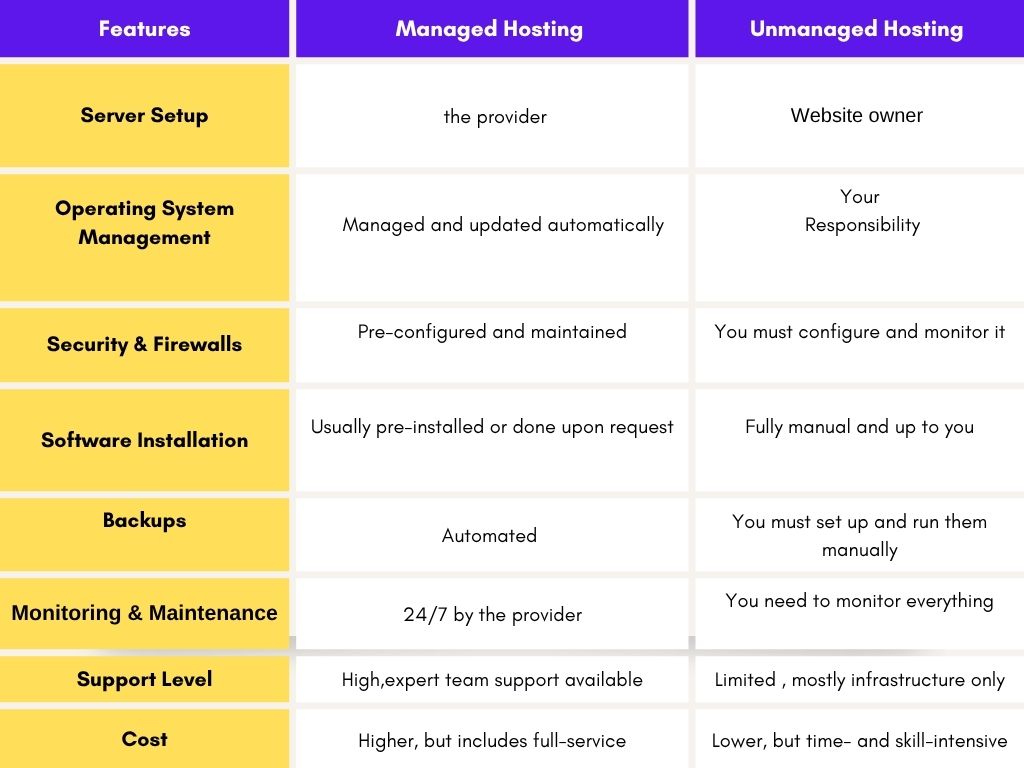Table of Contents
Having a website is a big decision, and once you’ve committed to building your online presence, the first thing to consider is web hosting. Comparing hosting solutions like shared hosting, VPS, WordPress, and WooCommerce is a vital starting point.
But once you’ve selected your hosting type, another crucial question arises: Managed or Unmanaged Hosting? I don’t know if you have the time or skills to manage a server.
Want full control and lower costs? Unmanaged hosting gives you that freedom, but with more responsibility.
In this article, we’ll break down the features, pros, and cons of both options, so by the end, you’ll have a clear idea of which hosting setup best fits your needs.
Understanding managed hosting:

It resembles hiring an employee to be responsible for all technical aspects of web hosting, exactly like how you assign all technical tasks.
Managed hosting is a web hosting service where the provider takes full responsibility for the technical side, including server management, maintenance, security updates, backups, and performance monitoring. It’s designed for users who either lack the technical expertise or simply prefer not to deal with the complexities of server administration.
With managed hosting, your provider essentially acts as your IT partner, ensuring your website runs smoothly, securely, and efficiently, so you can focus on growing your business instead of managing servers.
Key benefits of managed hosting:
- Hands-off server and infrastructure management
- Enhanced website security and regular updates
- Automated backups and disaster recovery support
- Expert technical assistance available 24/7
- Performance optimization, especially for CMS platforms like WordPress
For many small business owners and entrepreneurs, the ease and reliability of managed hosting make it a smart, time-saving investment, even if it comes at a higher cost.
Looking for reliable managed hosting? Explore Thamara’s best web hosting solutions and find the plan that fits your needs.
Exploring Unmanaged Hosting

Unmanaged hosting gives you a bare-bones server with full control. The hosting provider sets up the hardware and installs the operating system, then hands you the keys. From that point on, you’re responsible for everything else.
That includes installing software, configuring server settings, managing updates, securing the environment, and performing regular backups. The provider ensures the server stays physically operational and connected, but all other responsibilities fall on you
This type of hosting is most commonly offered with VPS and dedicated servers, and it’s best suited for users with a strong technical background or businesses with internal IT resources.
Key characteristics of unmanaged hosting:
- Full root access and control
- You manage security, updates, and server setup
- Lower cost compared to managed hosting
- Requires advanced technical knowledge
- High flexibility for custom configurations
If you’re comfortable working in the command line and want maximum control over your hosting environment, unmanaged hosting can be a powerful and budget-friendly choice.
Still deciding between hosting types? Check out our comparison of shared hosting vs. VPS hosting to better understand which environment suits your website’s needs.
Key Differences & Responsibilities
While managed and unmanaged hosting may offer similar server environments, the core difference lies in who handles what, and that distinction can significantly affect your time, budget, and technical burden.
Here’s a breakdown of the key differences between the two:

In short:
- Managed hosting is about convenience and support; you pay more, but your provider handles the heavy lifting.
- Unmanaged hosting is about control and cost; you save money, but you take on all the responsibility.
Understanding these differences will help you match your hosting provider’s responsibilities with your own technical ability and business goals.
Who Should Choose Managed Hosting?
Managed hosting is the go-to choice for individuals and businesses who want a worry-free experience and prefer to focus on their business, not server setup or technical issues. It’s perfect for those who prioritize convenience, security, and expert support over complete control.
You should consider managed hosting if:
- You lack technical expertise
No coding? No problem. The hosting provider handles everything from software updates to backups. - You want to save time
Whether you’re a solo entrepreneur or leading a small team, your time is valuable. Let the provider handle the backend. - You run a business-critical website
Downtime can cost you money or customers. Managed hosting ensures higher uptime and proactive monitoring. - You want peace of mind
Security patches, DDoS protection, and daily backups are all managed — so you don’t have to worry. - You use platforms like WordPress or WooCommerce
Managed hosting often includes one-click installs, performance optimizations, and CMS-specific tools.
✅ In short: If you want your website to “just work” without diving into the technical side, managed hosting is likely your best fit.
Who Should Opt for Unmanaged Hosting?
If you’re experienced, enjoy customizing your tech stack, and want full control over your hosting environment, unmanaged hosting gives you that freedom. It’s ideal for users who are technically skilled or willing to learn and take responsibility for server management.
You should consider unmanaged hosting if:
- You have strong technical expertise or are comfortable using command-line tools.
- You want full root access to customize every layer of your server.
- You’re looking for a cost-effective solution and are able to handle updates, security, and performance on your own.
- You want to experiment or build highly customized applications.
⚠️ Keep in mind: With unmanaged hosting, the provider delivers the server, and you take it from there. If you’re not ready to manage security, backups, and configurations, this option might become overwhelming.
Making Your Decision
After exploring the difference between managed and unmanaged hosting, it all comes down to this: How much control are you comfortable with, and how much support do you need?
If you’re looking for peace of mind, enhanced performance, and expert help when you need it, managed hosting is the smart, hassle-free choice, especially for business owners, entrepreneurs, and anyone who just wants their website to run smoothly without diving into the technical backend.
👉 Ready to choose what works best for you? Compare hosting plans and discover how Thamara can help you launch faster, safer, and smarter.
FAQS
1. What is the difference between managed and unmanaged hosting?
Managed hosting includes technical support, automatic updates, and server monitoring, while unmanaged hosting gives you full control with minimal assistance from the provider.
2. Who should choose managed hosting?
Managed hosting is ideal for beginners, non-technical users, or businesses that want a hassle-free hosting experience.
3. Is unmanaged hosting cheaper than managed hosting?
Yes, unmanaged hosting is generally more affordable, but it requires technical knowledge to manage the server on your own
4. Does managed hosting improve website performance?
Yes, managed hosting often includes performance optimization, automatic updates, and expert-level support that can boost your website’s speed and uptime.



